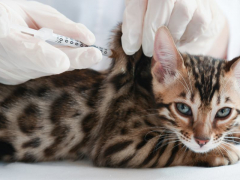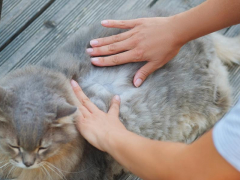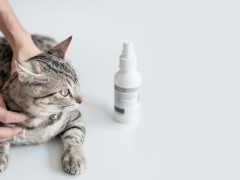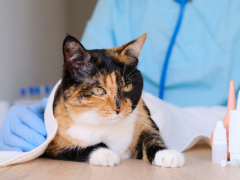
Fenbendazole is a broad-spectrum dewormer commonly used in veterinary medicine to treat pets for a variety of nematode (worm) and protozoal parasites. Common brands include Panacur and Safe-Guard.
In this article, you’ll learn what fenbendazole is, how it works, and the types of parasites in cats it may be used for, as well as some frequently asked questions.
Fenbendazole for Cats Overview

About Fenbendazole for Cats

Fenbendazole is classified as a benzimidazole antiparasitic agent and has a very wide range of effect against a variety of internal parasites.
Microtubules are structures within cells that assist in transport of materials within the cells. Fenbendazole acts to disrupt this transport system in affected parasites. At higher doses, it may also disrupt metabolic enzymes and pathways of affected parasites.
What Does Fenbendazole Do for Cats?

Fenbendazole can have efficacy against a variety of internal parasites commonly found in cats, including roundworms, hookworms, whipworms, lungworms, the protozoal parasite Giardia, and several others.
While it is helpful to know what fenbendazole does treat, it is also important to be aware of what it does not treat.
While it can be used to treat tapeworms, this is only for tapeworms of the Taenia species. Dipylidium caninum, which is more commonly seen in cats when they ingest a flea, requires a different dewormer for treatment.
Fenbendazole also does not have efficacy against coccidian parasites like Isospora, which may sometimes be seen in a cat’s stool sample and/or cause gastrointestinal disease.
It is not effective against Toxoplasma gondii, which causes toxoplasmosis, the disease human physicians often counsel pregnant women about in regards to avoiding contact with a litter box or cat feces during pregnancy.
Heartworms, which are not intestinal worms, but are transmitted by mosquitoes and dwell in the major vessels near the heart as well as the heart chambers themselves, are not affected by fenbendazole. While not covered here, there is no approved treatment for heartworms in cats.
Side Effects of Fenbendazole for Cats
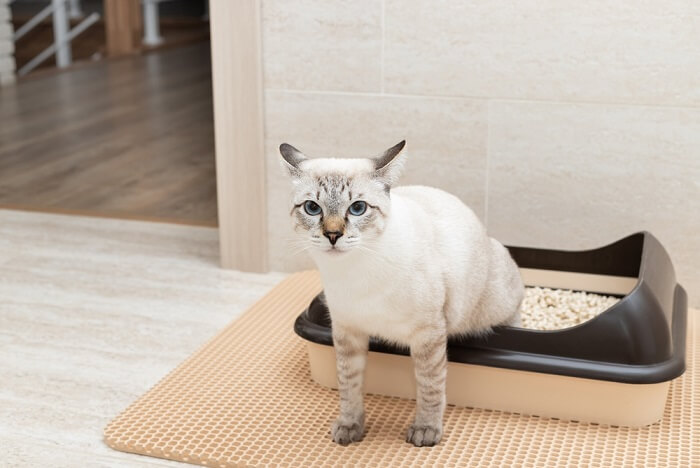
Some cats may experience temporary diarrhea while taking fenbendazole.
At appropriate dosages, fenbendazole does not typically cause any adverse reactions on its own. Infrequently, drooling, vomiting, or diarrhea may occur.
It is important to remember that the job of any dewormer is to kill internal parasites. This means that sometimes, a reaction may occur to components released by a dying parasite, especially in cases where a very high parasite load is present.
In these cases, drooling, vomiting, diarrhea, or GI discomfort may be more likely to be seen. Typically, these signs are temporary, but if concerning, should be reported to an attending veterinarian in case some supportive care is needed.
Fenbendazole for Cats Dosage
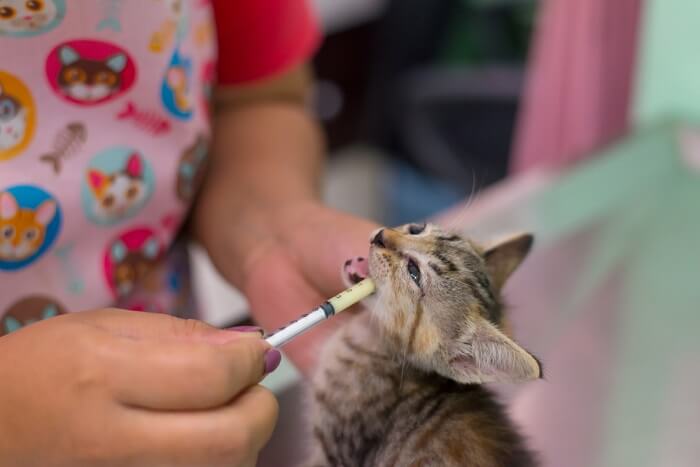
Your veterinarian will tell you the proper dosing for fenbendazole, which is determined by weight.
While it is FDA approved for use in dogs, fenbendazole is not labeled for use in cats and all dosing is considered extra-label in kitties.
For this reason, any products labeled only for dogs, including over the counter products like Safe-Guard, should be reviewed first with your vet to determine what dose will work best for your cat.
Dosing depends on body weight. Duration of treatment with fenbendazole depends on the type of parasite, where it may be used for anywhere from three to up to 10 or more consecutive days.
Remember that not all digestive disturbances are caused by intestinal parasites and fenbendazole does not treat for all potential parasites. Any use of a dewormer should be based on results of a fecal/stool sample or otherwise as directed by a veterinarian.
Fenbendazole only comes in powder or liquid suspension forms that are appropriate for use in small animals. The powder can be tricky to properly portion out and dose for some smaller cats and kittens, another reason to refer to your vet for proper instructions.
The liquid oral suspension requires a prescription, but comes in a 1 liter bottle size, making it impractical as a choice for a single treatment course. Veterinary practices typically dispense individual doses or smaller dosage volumes to use for treating a cat or kitten for susceptible parasites.
The syringe paste intended for use in horses is also impractical to use in cats, as they typically require doses much smaller than the increments on the syringe.
Conclusion
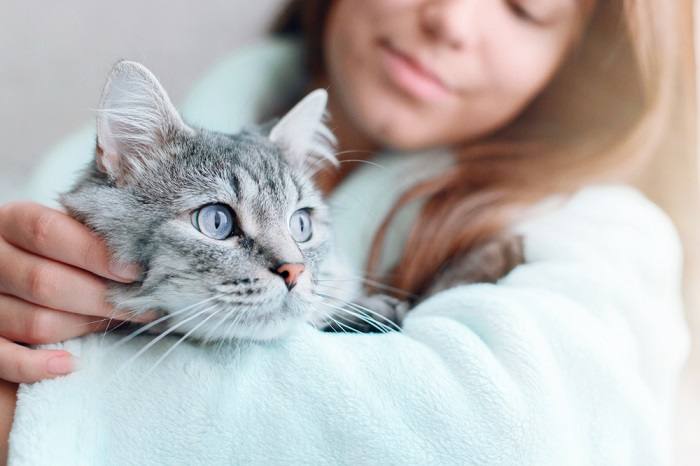
Fenbendazole is a very effective and safe broad-spectrum dewormer used commonly to treat cats and kittens for a variety of internal parasites. It is important to remember however that it does not treat all parasites, and not all digestive disturbances are caused by parasites. That’s why it’s important to work with your veterinarian to determine if using fenbendazole is appropriate.
Drug Dosing Disclaimer: We are only able to provide doses for medications that are FDA approved for use in cats and only as the label guidelines dictate. For medications that are used off-label we can only provide guidelines and safety information for use. Safe and appropriate dosing for off-label medications can only be determined by a primary care veterinarian.
We encourage you to work with your veterinarian to determine if a particular medication is appropriate for your cat. Changing or adjusting a dose for your cat on your own without consulting with a veterinarian can carry risk. We do not encourage use of medications prescribed for human use in pets without first consulting with a primary care veterinarian.
